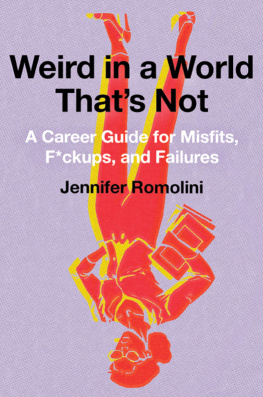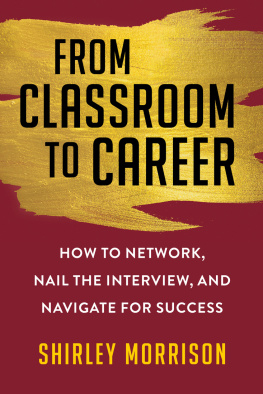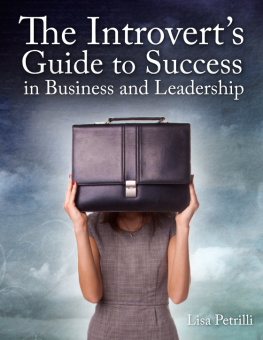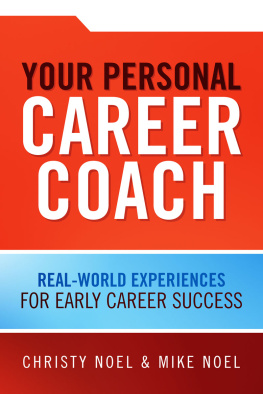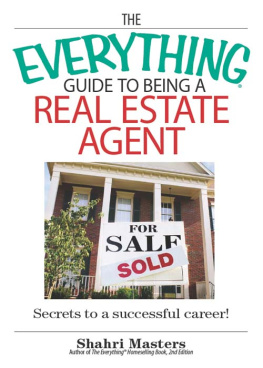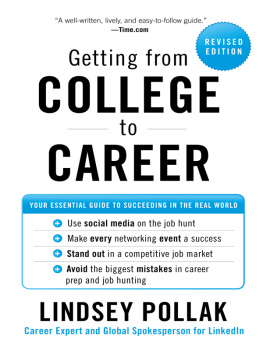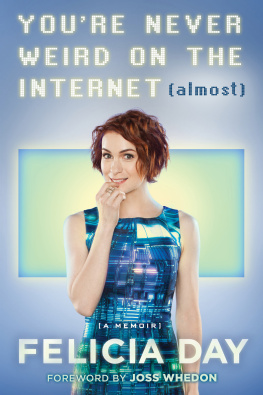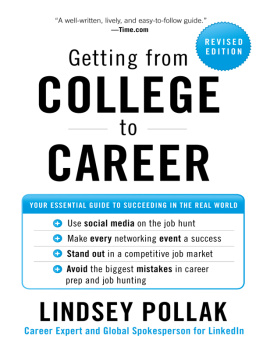I am indebted to the smart women who took time to read this book early, who gave thoughtful feedback and made it infinitely better: Piper Weiss, Gina Mei, Taylor Trudon, Sarah McColl, Kayleigh Roberts, Kristen Lisanti.
For the #boss women who taught me to be a better one: Sara Nelson, Jessica Jensen, Annette Cardwell, Lori Bongiorno, Kim France. And for David Carr, who gave a damn.
Writing a book is a lonely enterprise; it can make you strange. I am forever grateful for the support of the following humans while I was writing this one: Rumaan Alam, Clayton Doyle, Matt and Kristy Alper, Claire Girolo, Liz Flahive, Jeff Cox. My familyJoe, Lynn, Nicolas, Michelea gaggle of beautiful weirdos. My daughter, Charlotte Jane Pappademas, who makes everything better. To feel known and loved for who you truly are is the best we can hope for in this life. I am lucky beyond measure for my brilliant husband, Alex Pappademas, who knows that I am but an awkward wolf in ladys clothes and who loves me because of it.
I ts hard to pinpoint a precise start date for my weirdness. It is, as most things in life, inextricably linked to my parentstheir successes and failures; their choices and fate. In order to share my story, I need to share theirs, at least for context.
My mom was sixteen when she met my dad. She was skinny and tall, a second-generation Italian American girl with angular features and dark hair nearly to her waist. She wore baby-doll dresses over bell-bottom dungarees and was tough, smart, and young-Cher pretty. She was poor, living at the time with her mother, my grandmother, a struggling single mom. My grandfather was an opera singer but mostly a grifter, mostly a cheat. When he left, my grandmother experienced severe bouts of depression that sometimes led her to severe situations involving straitjackets and electric shock treatments and, finally, lots and lots of Catholic God. My mom was the only one around to deal.
When my parents met, my dad was a seventeen-year-old high-school dropout hauling around a set of torment baggage perhaps even heavier than my moms. He was a runaway and a bit of a thug, hanging on corners at night and during the day, working at a deli in the southwest section of Philly, where they sold cigarettes, which my mother came in and bought. My parents started dating. They went to see Play Misty for Me. Their song was Roberta Flacks The First Time Ever I Saw Your Face. They escaped into each other and fell deeply in love. A year later I was born. A few months earlier, at their wedding in my grandmothers living room, my dad wore the same suit he had worn to take my mom to the prom.
We lived in a rickety row house on a run-down block in a poor part of Philadelphia next to a dive bar called Texs Tavern. My parents fixed up the house with spider ferns and macram and a blue shag carpet, and at some point we got a dinged-up white piano, though no one could play. We had a dog named Puppy for a time and an aquarium with a wide-eyed catfish who grew to be bigger than my arm. We had an iguana named Nighta whom we fed bananas until he died one day behind the couch. We had a turntable stored in a cinderblock shelving system my dad built where we played Led Zeppelin, Pink Floyd, and Jethro Tull albums on repeat, and a round dining room table that was rarely not strewn with ashtrays and wicker-wrapped Italian wine.
Teenagers are impetuous and passionate. Teenagers brains are not fully formed. My parents were no different. My parents and their friends lived a teenage-appropriate life: they drank too many things, they smoked too many things; they had impromptu dance parties and inappropriate jealousies. They made terrible impulsive decisions and wonderful impulsive ones too. Our 1970s life was extremeextremely happy, extremely sad, and sometimes extremely violent. My parents tried new drugs and new diets and new politics and then, when they grew tired of these things, went on spontaneous road trips with their friends. I went on these road trips too. I was the only kid around.
We shared motel rooms at the beach, we shared cabins in the mountains. Women wore caftans and men brought flutes and bongos, guitars and weed. When we got home, I played in a fort wed made out of a cardboard refrigerator box. At night, in bed, I pulled the covers over my head and staged my stuffed animals in a pile over them, disguising the lump of my body so no one would know I was there.
On Sundays my parents and I got dressed up and drove deep into South Philadelphia to my great-grandfathers house for family dinners. He was an off-the-boat Italian, red horn in the doorway of his row home, red tomatoes growing in buckets in his cement backyard. Downstairs, in the basement, he made fresh linguine, pizza, and barrels of red wine. He sculpted birds out of iron. He played the violin. The house smelled of flour and disinfectant and dried peppers. He spoke broken Italian and broken English with a thick Old World accent. He called me Jen-o-eff and Jen-o-fee. He was an orphan who came to America after World War I. No one really hired Italians back then, they said; hed never really had a job. My great-grandmother had supported the family as a seamstress, but that was before. Now she sat in a wheelchair in the corner of the room, by the window, overlooking the narrow South Philly street where they lived. She called me Mommy; she gave me quarters and folded-up dollar bills. She asked me to pick up thread and crumbs and fuzz she saw but couldnt lift from the ground.
There are stories I remember from these years and stories I dont. They are told today around big tables in the suburbs where my parents and their friends catch up and talk and where I am treated like I am the child of all of them. Some of the stories are mild, and some are cool: I met David Bowie when I was just over a year old. My mom was a Bowie super fan; the song Kooks, about a baby born to two free-spirited misfits (Bowie and his wife, presumably), was a kind of family anthem. My mom had seen Bowie in concert several times but was desperate to meet him. At a show one night in the city she and I waited outside the back entrance of the stadium for hours. When Bowie finally emerged, he paused at my mom. He stopped and signed her album. He touched my face and said I was cute. Everyone was excited, everyone was delighted.
There are other stories too, like the one where were all on a summer road trip in rural New Jersey, driving in separate cars. My mom and I and some friends are in a van, and my dad and his friends are driving in another car, and somehow in the bustle of stopping at a rest stop, unloading, and getting back in the cars, Im left behind as everyone drives off. They realized their mistake a few miles up the road, Im told, shouting at each other, at high speed, through open windows: Do you have Jennifer? No, do you?
When my parents returned, they found me off to the side, sitting under a tree. I had been there less than a half hour, but even now, I imagine it as a full day. I was four.
Who knows how we become people, how we map our patterns of joy and loss and failure into one walking-around-the-planet human. Who knows whether I understood loneliness for the first time that day or whether I understood it through the hundreds of subtle around-people-but-inside-yourself seconds that happen throughout a life, all lives, seconds the hypersensitive can rarely escape. But I know this: that day at the rest stop is one of my first vivid memories of being alive. I have felt other, like an outsider looking in, since.

